Riga Travel Guide
Situated on the south-western coast of the country, the capital, Riga, is the biggest city in the Baltic States and is slowly coming into its own as a major European tourist destination. Riga is split in two by the River Daugava, and historically served as a major trading port and a crossroads between western Europe and the East. The modern founding of the city dates back to the 12th century with the arrival of German traders, mercenaries, and missionaries, while its older roots date back to a settlement of the ancient Finnic tribe, the Livs.
Riga boasts a collection of exquisite Art Nouveau buildings that rival those in Vienna, Barcelona, and St Petersburg, and the fairytale historic city centre is a delight to explore. As the cultural and economic centre of the country, Riga is home to plenty of top-class museums, galleries, and performing arts centres. It also has a wide range of sophisticated bars, clubs, and restaurants. The city is fast gaining a reputation as a party capital, and its vibrant nightlife draws hundreds of weekenders from all over Europe.
For a more traditional Latvian experience, it is well worth braving the winter cold to enjoy a spot of ice fishing, ice-skating on the frozen Daugava River, or a a rigorous sauna involving being beaten with dried birch branches. With over 800 years of history, a UNESCO-World-Heritage-Site-listed historic city centre, and a modern buzz, Riga remains a largely undiscovered gem with plenty to delight and enchant the visitor.
Things to do in Riga
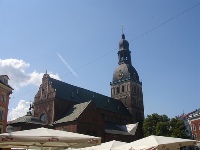
Dom Cathedral
Dating back to 1211, the red brick Dom (or Dome) Protestant Cathedral is a highlight of the historic centre of Riga. The cathedral is situated near the Western Daugava River and boasts an incredible organ with over 6,500 pipes built in 1844, stained-glass windows, and a beautifully whitewashed interior. There are regular concerts held on the organ, and the cathedral also has its own boys' choir that gives regular performances. The Dom Protestant Cathedral is a great historical sight in Latvia that earns rave reviews from all who experience it.

Riga Castle
Riga Castle (or Riga Pils) was built in 1330 on the site of the original settlement of the city as a residence for the master of the Livonian Order, and later it served as the base for the city's occupiers throughout its history. The distinctive yellow castle was destroyed and rebuilt over time, and today it serves as the offices and home of the Latvian president, as well as the Latvian Museum of Foreign Art and the Rainis Museum of Literature and Art History. The castle is strategically placed on the banks of the Daugava, originally in order to oversee all ships entering the city's port, and has four towers and an inner courtyard.
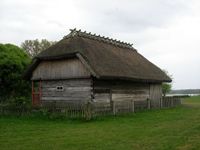
Open Air Ethnographic Museum
Tucked away in the pine forest around Lake Jugla, the Open Air Ethnographic Museum is a fascinating and intimate reflection of the traditional Latvian way of life. Set on 247 acres (100ha), the museum consists of farmhouses, fishing villages, windmills, and other historic buildings relocated here to create an outdoor exhibit. Visitors to Riga can watch craftsmen at work, sample traditional Latvian cooking and ales at a handful of restaurants, and learn more about the history of this deeply interesting country. The museum is also has a craft where visitors can pick up souvenirs.
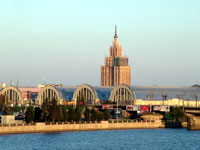
Riga Central Market
One of the oldest and biggest of its kind, Riga's Central Market was first opened in 1930 and is a riot of sounds, sights, and smells. Anything from fresh fruits, cheeses, and whole sheep carcasses to appliances and clothing are on offer, usually at very reasonable prices. The market was moved from its original home and relocated several times, but since the 1930s has occupied the same space in several World War I hangars, close to the bus and train stations. There is room for over 1,000 vendors, and no visit to Riga is complete without a stroll through its tantalising stalls.
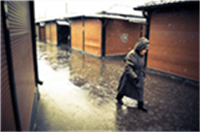
The Museum of the Occupation of Riga
Latvia was occupied from 1940 to 1991 by two successive regimes in the forms of Nazi Germany and Soviet Russia. This well-curated museum conveys what life was like during this time, and serves as a memorial to those who died or fled as a result of the occupation. Visitors can view film archives and see a reconstruction of life in the infamous Siberian labour camps. A sobering and humanising experience, highly recommended for those who wish to connect to Latvian culture while on holiday in Riga.
Art Nouveau Architecture
The city of Riga contains the highest concentration of Art Nouveau architecture in the world. Otherwise known as Jugendstil, some of the buildings in central and downtown Riga date as far as the late 19th century. The style is characterised by unusual shapes, curved and organic arches, gargoyles, carved faces, and flamboyant cornices. Over 30 percent of central Riga's buildings were created in this style, many supervised by famous Russian architect Mikhail Eisenstein. The best streets to view buildings on are Elisebetes, Strelnieku, and Albert. The Riga Art Nouveau Centre, located in central downtown, has been furnished in the Art Nouveau style allowing visitors to fully immerse themselves in the early 20th century.
Riga Motor Museum
What is undoubtedly eastern Europe's finest motor museum is tucked away on the outskirts of Riga, and makes for an essential outing if visitors enjoy classic cars and Soviet history. The museum contains Molotov's limousine, Stalin's bombproof sedan, and the wreck of Brezhnev's car in which he crashed. The model dummies in the vehicles are a nice touch. There is a priceless collection of classic sports cars and motorcycles, irresistibly photogenic for petrol heads.
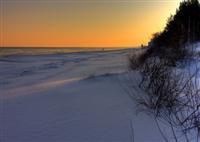
Jurmala
Jurmala is the main holiday resort town in Latvia, the place locals go to when they want to relax, catch a tan, and enjoy a spa treatment. The beaches are very good and the seafood restaurants are excellent too. Apart from sand and sea, the main attractions of Jurmala are its spas, which offer a range of therapies and treatments at a fraction of what they'd cost in western Europe. Getting to Jurmala from Riga is easy: by train or bus, the journey takes 30 minutes. Jurmala is fast becoming one of eastern Europe's best spa destinations, and tourists are urged to check it out before the secret gets out and prices begin to sky-rocket.
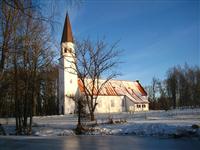
Sigulda
Just 33 miles (56km) from the capital, Sigulda is a picturesque little town located in the primordial Gauja Valley. It's well worth the trip for tourists to Riga. Dubbed the 'Switzerland of Vidzeme' due to the steep cliffs and caves that line the sides of the river gorge, Sigulda makes a wonderful base from which to explore Latvia's considerable natural bounty.
Notable tourist attractions of the area include the Medieval and Turaida Castles, with the former staging an annual open-air Opera Festival in the summer. Gauja National Park is within touching distance of Sigulda and offers great activities such as walking trails and bungee-jumping in summer; and luge, bobsledding, and skiing in the winter.
The town of Sigulda itself is particularly worth visiting in spring, when cherry blossoms bloom; and in autumn, when the town seems to take on the blood-orange hue of the leaves falling from its trees. Visitors should be sure to visit the Gutmanis Cave, the largest in the Baltic region, and the setting of the Latvian folktale of the Rose of Turaida.
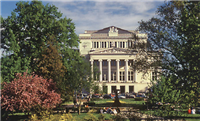
Latvian National Opera
The Latvian National Opera building is a magnificent 19th-century structure, home to the National Opera, Ballet, and Orchestra companies. Built by the St Petersburg architect Ludwig Bohnstedt and opened in 1863, the columned and colonnaded building is incredibly photogenic. Guided tours of the opera building take place at 5pm every Friday, and are a very popular tourist attraction in Riga. Culture lovers should also check out the Latvian National Opera's website for programme information. The country has a proud classical music history, with the influential German composer, Richard Wagner, serving as Director of Music in Riga between 1837 and 1839, and recitals are often of rare quality.
Eating Out
Riga's food scene offers traditional Latvian food, which is dominated by typical Russian and Eastern European dishes, and many international favourites that range from Italian cuisine and Japanese specialities to American steakhouses. Restaurants tend to serve seasonal produce, meat, and fish (thanks to Latvia's position on the east coast of the Baltic Sea), and guests should make a point of trying the dark rye bread called rupjmaize, as it's considered a national staple. Visitors must try Riga's famous Black Balsam. The 45 percent alcoholic liqueur is thick and black yet smooth and velvety, and is said to cure sore throats as well as hangovers.
Shopping
Riga is a good place to buy local crafts, alcohol, and foodstuffs, but imported goods are very expensive. The highest concentration of shops is in the Old Town and the city centre. One of the best souvenirs to buy in Latvia is amber, for which the country is world-famous. Travellers should look out for amber set in silver jewellery. Other quality buys include woollen jerseys and hats with distinctive Baltic patterns, the local liqueur Black Balsam, and World War Two memorabilia. Bargaining is not expected and unlikely to be successful. A great shopping experience is a visit to the huge Central Market, located in five cavernous pavilions. Everything can be bought here, including fresh fish, fruit, honey, and cheap clothes.
Nightlife
Riga has a varied nightlife, mostly centred round the Old Town, where many clubs, bars, casinos, and live music venues can be found. Riga is also famous for its classical entertainment, with symphonies and operas taking place throughout the year. Close proximity makes walking between nightlife venues a viable option, though visitors should be cautious late at night, as muggings are often reported. The larger clubs attract stag groups from the UK and Scandinavian duty-free tourists. Travellers should stick to the smaller bars if they want a less rowdy experience.
Getting Around
Riga has a well-developed and relatively cheap public transport system that consists of buses, minibuses, trams, and trolley buses. Most services run from 5am to as late as 1am and some routes run a regular night service. Tickets can be bought on the bus, trolley, tram or online. Final destinations are marked on the front of all transport vehicles. Taxis are readily available, and it is worth noting that licensed cabs will have a yellow number plate. Passengers can risk an unlicensed taxi, but drivers usually turn off the meter and the price needs to be negotiated beforehand. Riga's ferry terminal is located less than half a mile (1km) north of Old Riga. The central train station will take commuters to destinations in Russia, Belarus, and Ukraine. Uber and Lyft also operate in the city.
Riga Climate and Weather
Riga has a moderate climate, influenced by its close proximity to the sea. Summers tend to be short and cool with cloud cover, and high temperatures average around 64F (18C). Winters are usually long, dark and cold, with temperatures averaging between 18F (-8C) and 28F (-2C) in January. Snowfall is heavy and snow cover usually lasts from mid-December to mid-March. The city is overcast for roughly 40 percent of the year.
Latvia travel info
Electricity
The electrical current is 230 volts, 50Hz. European style two-pin plugs are in use.
Language
Latvian is the official language, but English, Lithuanian, Russian and German are also spoken.
Money
The official currency is the euro (EUR). All major credit cards are accepted and there are plenty of ATM machines for withdrawing local currency. Foreign currency can be exchanged at any bank, at money change kiosks and at some hotels. Everyone travelling between Latvia and any non-EU country must declare amounts over 10,000 EUR or equivalent. This covers all forms of currency, not only cash. Most banks are closed on Saturdays and Sundays.
Tipping
Tipping is not obligatory in restaurants, but it is customary to round up the bill to the nearest 10 if a service charge has not been included and the service was good. In hotels, guests can tip according to the services provided.
Health
No health certificates or vaccinations are required to enter Latvia, but visitors are advised to have an inoculation against tick-borne encephalitis if they're planning to hike in the country and forests, or stay in rural areas, especially during the summer months of March to October. Latvia is free of dog rabies, but the disease may be present in wildlife species such as bats. Travellers who may come into contact with wildlife should discuss rabies vaccination with a health care professional. Medicines are usually available, but it is best to bring a supply of personal medication. Health insurance is necessary. After Brexit, the Global Health Insurance Card (GHIC) replaced the European Health Insurance Card (EHIC) for UK citizens. The GHIC allows UK citizens access to state healthcare during visits to the EU. The GHIC is not valid in Norway, Iceland, Liechtenstein or Switzerland, nor is it an alternative to travel insurance.
Safety
Most visits to Latvia are trouble-free, but tourists should be wary of street crime, as there are occasional muggings of foreigners, particularly if they're walking alone or at night. Car theft occurs; reports of foreigners being charged extortionate prices for drinks or having fraudulent transactions debited against credit or debit cards have fallen considerably, but it's best to remain vigilant.
Local customs
Latvians are generally reserved, quiet and extremely courteous, and are not comfortable making small talk. Good manners dictates that people are not embarrassed or criticised in public. Drinking alcohol in public is prohibited and may lead to detention and a fine. Possession of even very small quantities of drugs can lead to lengthy pre-trial detention and possible imprisonment.
Doing business
Conducting business in Latvia can sometimes be a challenge due to bureaucracy, as well as the lack of English spoken. Business tends to be formal, with a clear-cut hierarchy, and titles are usually used. Punctuality, directness and organisation are all important. Suits and ties are the norm and, when in doubt, it's best to dress conservatively. Women might encounter some sexism and roles should be clarified to avoid confusion. Business hours are usually from 9am to 6pm, Monday to Friday.
Duty free
Travellers to Latvia over the age of 17 and arriving with goods purchased in the EU for personal use do not have to pay duty on 800 cigarettes, 400 cigarillos, 200 cigars, 1kg smoking tobacco; 10 litres of spirits with alcohol content higher than 22 percent, 20 litres of alcohol with alcohol content lower than 22 percent, 90 litres wine or 60 litres of sparkling wine, 110 litres of beer, and 110 litres of non-alcoholic beverages. Travellers arriving from non-EU countries do not have to pay duty on 200 cigarettes, or 100 cigarillos, or 50 cigars, or 250g smoking tobacco; 1 litre of spirits with alcohol volume higher than 22 percent, or 2 litres spirits, aperitifs, liqueur, sparkling or still wines with alcohol volume less than 22 percent and 2 litres still wine; perfume up to 50g or 250ml eau de toilette; other goods for personal use to the value of €400. Prohibited items include narcotics, guns, and fresh food products.
Communications
The international dialling code for Latvia is +371. The outgoing code is 00 followed by the relevant country code (e.g. 0044 for the UK). Hotels, cafes and restaurants offer WiFi, and visitors can purchase local prepaid SIM cards for unlocked phones.
Passport & Visa
The borderless region known as the Schengen Area includes the following countries: Austria, Belgium, Czech Republic, Denmark, Estonia, Finland, France, Germany, Greece, Hungary, Iceland, Italy, Latvia, Lithuania, Luxembourg, Malta, The Netherlands, Norway, Poland, Portugal, Slovakia, Slovenia, Spain, Sweden and Switzerland. All these countries issue a standard Schengen visa that has a multiple entry option, and which allows the holder to travel freely within the borders of all the aforementioned countries. Additionally, foreign passengers to Latvia must hold valid health insurance, that includes provision for repatriation costs. It is highly recommended that traveller's passports have at least six months' validity remaining after the intended date of departure from their travel destination. Immigration officials often apply different rules to those stated by travel agents and official sources.
Entry requirements
US citizens must have a passport that is valid for at least six months beyond the period of intended stay in Latvia. A visa is not required for stays of up to 90 days within a 180 day period.
UK citizens must have a passport that is valid for at least three months beyond the period of intended stay in Latvia. A visa is not required for stays of up to 90 days within a 180 day period.
Canadian citizens must have a passport that is valid for three months beyond the period of intended stay in Latvia. No visa is required, for a stay of up to 90 days within a 180 day period.
Australian citizens must have a passport that is valid for three months beyond the period of intended stay in Latvia. No visa is required for a stay of up to 90 days within a 180 day period.
South African citizens must have a passport that is valid for three months beyond the period of intended stay, and require a valid Schengen visa to enter Latvia.
Irish citizens must have a passport that is valid for the period of intended stay in Latvia. No visa is required.
New Zealand citizens must have a passport that is valid for three months beyond the period of intended stay in Latvia. No visa is required, for a stay of up to 90 days within a 180 day period.
Useful contacts
Latvia Tourist Board, Riga: www.latviatourism.lv
112 (fire and rescue), 113 (medical emergencies), 110 (police).Embassies / consulates in other countries
Embassy of Latvia, Washington DC, United States: +1 (202) 328 2840.
Embassy of Latvia, London, United Kingdom: +44 20 7312 0041.
Embassy of Latvia, Ottawa, Canada: +1 613 238 6014.
Embassy of Latvia, Melbourne, Australia: +61 3 9499 6920.
Honorary Consulate of Latvia, Johannesburg, South Africa: +27 11 750 1600.
Embassy of Latvia, Dublin, Ireland: +353 1 478 0161.
Consulate of Latvia, Auckland, New Zealand: +64 21 190 2618.
Embassies / consulates in Latvia
United States Embassy, Riga: +371 7036 200.
British Embassy, Riga: +371 777 4700.
Canadian Embassy, Riga: +371 781 3945.
Australian Embassy, Berlin (also responsible for Latvia): +49 30 88 00 88 0
South African Embassy, Stockholm, Sweden (also responsible for Latvia): +46 866 076 93.
Embassy of Ireland, Riga: +371 6703 9370.
New Zealand Embassy, Warsaw, Poland (also responsible for Latvia): +48 22 521 0500.



